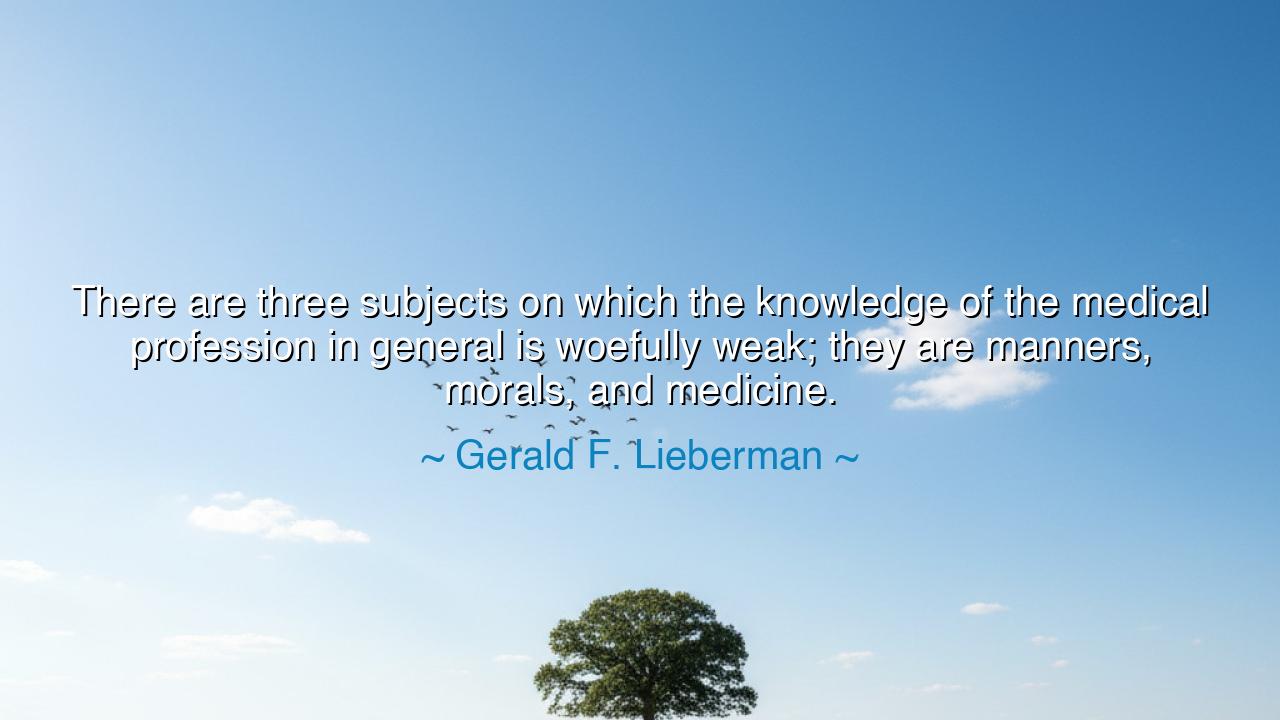
There are three subjects on which the knowledge of the medical
There are three subjects on which the knowledge of the medical profession in general is woefully weak; they are manners, morals, and medicine.






“There are three subjects on which the knowledge of the medical profession in general is woefully weak; they are manners, morals, and medicine.” Thus spoke Gerald F. Lieberman, not in cruelty but in irony, with the sharp wit of one who had looked upon the world and found that even the healers of mankind are not immune to its blindness. Beneath his jest lies a blade of truth — that knowledge without humanity is hollow, and that those who seek to cure the body must first learn to tend the spirit. For what is medicine without morals? What is healing without manners? What is knowledge itself if it does not serve compassion?
In the ancient days, the physician was not merely a mechanic of flesh and bone, but a guardian of virtue, a servant of both wisdom and kindness. The art of healing was sacred — not merely because it mended bodies, but because it bound souls together in trust and care. Yet Lieberman, with his keen eye for human folly, saw how modern men of science had grown clever but cold, brilliant in instruments yet barren in heart. His words are not a jest only, but a lament for the loss of wholeness in the healer’s soul.
Consider the first of his triad — manners. To heal, one must first learn to speak gently, to look upon the sufferer not as a case but as a person. Yet too often, the physician strides in with the arrogance of knowledge, forgetting that the trembling patient before him seeks not only a cure, but also kindness. The gentle word, the patient ear — these are medicines too, and sometimes they heal where the scalpel cannot. For what comfort is there in science if it comes without sympathy?
Then comes morals, the compass that should guide the healer’s every choice. The ancients swore by the name of Hippocrates, vowing to do no harm. But in our age, profit, pride, and haste too often cloud the physician’s oath. Recall the tale of Ignaz Semmelweis, who in the 19th century discovered that washing hands could save lives. His peers scorned him, laughed him to ruin, and let mothers die rather than humble their pride. Here was a man of morals, destroyed by those who prized reputation above righteousness. From such tragedies, Lieberman’s warning rings all the more true: without virtue, knowledge is perilous.
And lastly, medicine itself — the very art the healer claims to master. Lieberman’s irony pierces deepest here, for he means that even in the science of healing, certainty is an illusion. Medicine is not omniscience; it is a humble partnership with mystery. The wise physician knows that every cure is borrowed from nature, every success a gift of chance and perseverance. But the fool believes himself a god, and thus blinds himself to learning. True medicine, like true wisdom, begins with the confession of ignorance.
Yet we must not condemn the healer too harshly, for his path is a hard one. Rather, let us take Lieberman’s words as a mirror — a reflection of all professions, all pursuits, all who hold power over others. For whether we teach, rule, heal, or serve, we too may forget that manners, morals, and mastery are one and the same fabric. To neglect one is to weaken all. The hand that heals must also care; the mind that knows must also love.
Therefore, let this be our lesson, O seeker of truth: let your knowledge be tempered by goodness, and your skill by humility. Learn the art of manners — to speak with grace and listen with heart. Guard your morals as a warrior guards his blade, for without integrity, no wisdom can save you. And pursue your craft not with pride, but with reverence for its limits. For the greatest healer is not the one who knows the most, but the one who sees the most deeply into the human soul.
And so, Lieberman’s jest becomes a timeless warning: that every art, if divorced from virtue, decays into vanity. Let us then strive to be whole — in mind, in heart, and in deed — so that our knowledge, whatever it may be, shall never be woefully weak, but wise, compassionate, and true.






AAdministratorAdministrator
Welcome, honored guests. Please leave a comment, we will respond soon